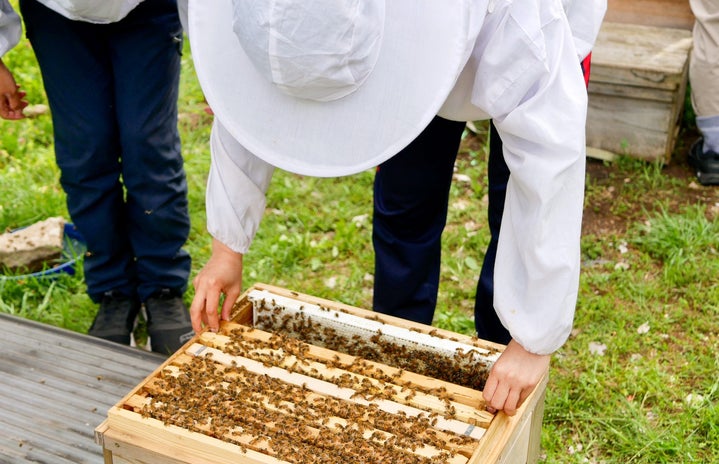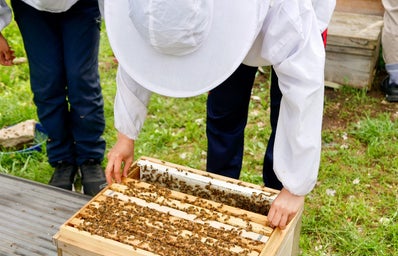Did you know that honey is being made in the ICU forest? When I first heard this, I was also shocked. I don’t think many students are aware of this fact.
I had the opportunity to speak with the representative of the ICU Honey Project, 24 student Kojima Daijiro. Through this interview, I hope to raise campus awareness and interest in the Honey Project.
ーーーーーー
Before we begin, could you please briefly explain what the ICU Honey Project is? How did it start?
(KD) Even I am not aware of who exactly started this project. But I know that a 20 or 21 student, Matsumura-san, took Professor Fujinuma’s Environmental Studies course and was inspired by a lecture on honeybees to suggest beekeeping on campus. The Honey Project is not a club: it is a project that is a part of Professor Fujinuma’s Environmental Studies course.
What is the motto and goal of (the) Honey Project?
(KD) Through the keywords “beekeeping” and “honey,” our goal is to raise awareness and knowledge of environmental issues. We want people to think about even the small steps they can take to protect the environment: remembering to turn off lights, saving water, etcetera.
Additionally, we want people to be able to think from the manufacturers’ perspective. We tend to buy our food from supermarkets, but it is also essential to consider the manufacturer’s goal and how they produce their food. We also typically are not aware of the kinds of pesticides that may have been used when growing the food. There are currently a lot of issues that are a result of the lack of understanding between the producer and the consumer. So by producing our honey and becoming primary manufacturers ourselves, we can become more aware of how love is made, along with the issues within the food system*.
Could you explain how the Honey Project has evolved since it began?
(KD) The project began in 2020, the same year that the covid-19 pandemic began. So it wasn’t until last year (2021) that the Honey Project was active. We harvested honey last year. In general, 80% of beekeeping is harvesting honey in the spring. You can harvest honey in summer as well, but unfortunately, we could not gather any last summer. We are selling the honey we collected in May and June last year. We’re sold out of honey from June, but honey from May is still available! You can purchase through our Instagram, so please be sure to check out our page if you are interested!
Have you been faced with any challenges in your activities so far?
(KD) Beekeeping itself is a first for most of our members, so working with beehives was difficult. Also, when we first started selling honey last year, there was some struggle in figuring out the business aspect. Everything from the price to the jar and logo was challenging to decide. We also had to determine our PR strategies for spreading the word about our product(s). All our members try different methods to find one that works.
How many jars of honey have you been able to sell so far?
(KD) One jar contains 100 grams of honey, and so far, we’ve been able to sell 200-250 jars. Currently, we are only selling ICU honey to people with relations to the school. Some of our sales include jars purchased by the ICU PR Office to be gifted as lottery prizes to those who made donations to the ICU.
What are the most memorable moments from your time in Honey Project so far?
(KD) Honey Project is generally divided into two domains: beekeeping and (honey) sales. Both can be extremely fun and rewarding. I typically work with the beehives, and every time I see the inside of a hive, it’s exciting to see the internal structure and how hard the honeybees are working. However, when it comes to working on the sales front, it’s always rewarding to hear from the customer(s) how happy they are to receive our honey. We are considering hosting some events shortly, so there are also people excited about that. Both domains can be a rewarding experience, but I enjoy beekeeping because I like animals and nature.
Was there a specific reason you decided to join the Honey Project?
(KD) I tend to practice my English listening skills by watching scientific YouTube videos in English. After coming to ICU, I learned that honeybees were going extinct through one of these videos. This is where my interest in the topic began. I emailed Professor Nunoshiba that I thought beekeeping on campus would be an exciting endeavor, and he informed me about the ICU Honey Project, which I joined.
Can you tell me why honeybees are going extinct?
(KD) The exact reason is still unknown, but one factor seems to be parasitic tics. Pesticides, especially neonicotinoid pesticides, also harm the bees, and electromagnetic waves can impair their sense of direction.
What information about honeybees and the environment are you spreading through the Honey Project?
(KD) I think that’s an area that we currently don’t focus enough on. We want to host more events in the future. But through the pamphlets attached to the jars we’ve sold to the ICU PR Office, we explain the activities of our organization along with our Sustainable Development Goals (SDGs). Recently we’ve collaborated with other ICU environment-related clubs, “Sustena” and “Chisannchishou,” and held joint orientation sessions.
We also hold discussions with those who participated in viewing our beehives. For example, we’ll compare a cheap jar of honey manufactured in China for 500 yen per kilogram with ICU honey that costs 1000 yen per 100 grams. Then we discuss what may be in the China-produced honey or talk about current issues and events in the agricultural industry.
Are there any future projects ICU Honey Project is currently planning?
(KD) First off, we’d like to expand the market for our honey. We are also planning a workshop event where we make beeswax and candles from our hives. Additionally, we would like to host a symposium where we discuss issues such as safety and the distance between manufacturers and consumers, along with the best way to shop for food. We’re open to hosting this as a joint event with other on-campus organizations; we want the opportunity to share our thoughts while hearing the opinions of others. It would also be nice if we could have attendees taste-test our honey.
Is there a particular message you would like to give to ICU students?
(KD) Please try tasting the difference between ICU honey and the cheap 1kg for 500-yen honey sold at Gyomu Supermarket. It’s shocking how different the taste is.
I currently help Kanai-san, who graciously assists the activities of the Honey Project and does beekeeping in Koganei. I’m often allowed to taste honey straight from the hive, and it’s honestly so good. You can even taste the flowers. It’s sweet but not too sweet; it’s so good that I can’t use words to describe the taste. I hope that everyone can find the opportunity to try natural honey. “Taste” can trigger us to think deeply about many things.
ーーーー
Honey is a food that may seem very common in our everyday life, but it also has the power to make us think about honeybees and other environmental issues. I find that to be very special.
Please check out ICU Honey Project’s Instagram account and try some of the honey that has been handmade by our fellow ICU students!
ICU Honey Project Official Instagram:


